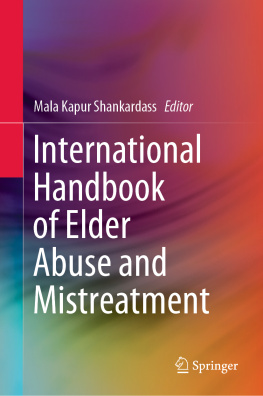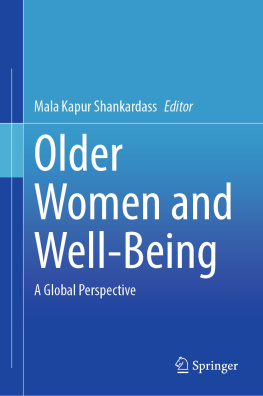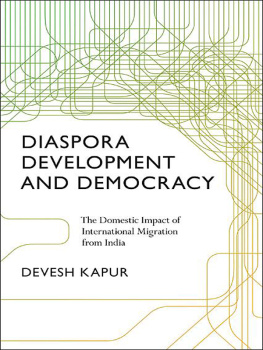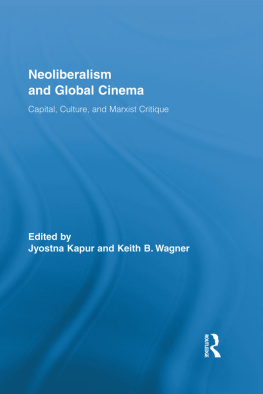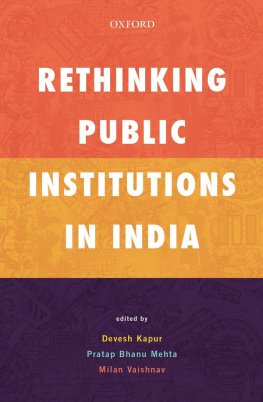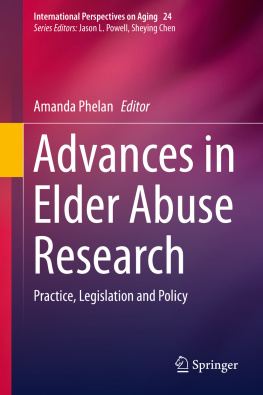Mala Kapur Shankardass - International Handbook of Elder Abuse and Mistreatment
Here you can read online Mala Kapur Shankardass - International Handbook of Elder Abuse and Mistreatment full text of the book (entire story) in english for free. Download pdf and epub, get meaning, cover and reviews about this ebook. year: 2020, publisher: Springer Singapore, genre: Politics. Description of the work, (preface) as well as reviews are available. Best literature library LitArk.com created for fans of good reading and offers a wide selection of genres:
Romance novel
Science fiction
Adventure
Detective
Science
History
Home and family
Prose
Art
Politics
Computer
Non-fiction
Religion
Business
Children
Humor
Choose a favorite category and find really read worthwhile books. Enjoy immersion in the world of imagination, feel the emotions of the characters or learn something new for yourself, make an fascinating discovery.
- Book:International Handbook of Elder Abuse and Mistreatment
- Author:
- Publisher:Springer Singapore
- Genre:
- Year:2020
- Rating:5 / 5
- Favourites:Add to favourites
- Your mark:
- 100
- 1
- 2
- 3
- 4
- 5
International Handbook of Elder Abuse and Mistreatment: summary, description and annotation
We offer to read an annotation, description, summary or preface (depends on what the author of the book "International Handbook of Elder Abuse and Mistreatment" wrote himself). If you haven't found the necessary information about the book — write in the comments, we will try to find it.
International Handbook of Elder Abuse and Mistreatment — read online for free the complete book (whole text) full work
Below is the text of the book, divided by pages. System saving the place of the last page read, allows you to conveniently read the book "International Handbook of Elder Abuse and Mistreatment" online for free, without having to search again every time where you left off. Put a bookmark, and you can go to the page where you finished reading at any time.
Font size:
Interval:
Bookmark:
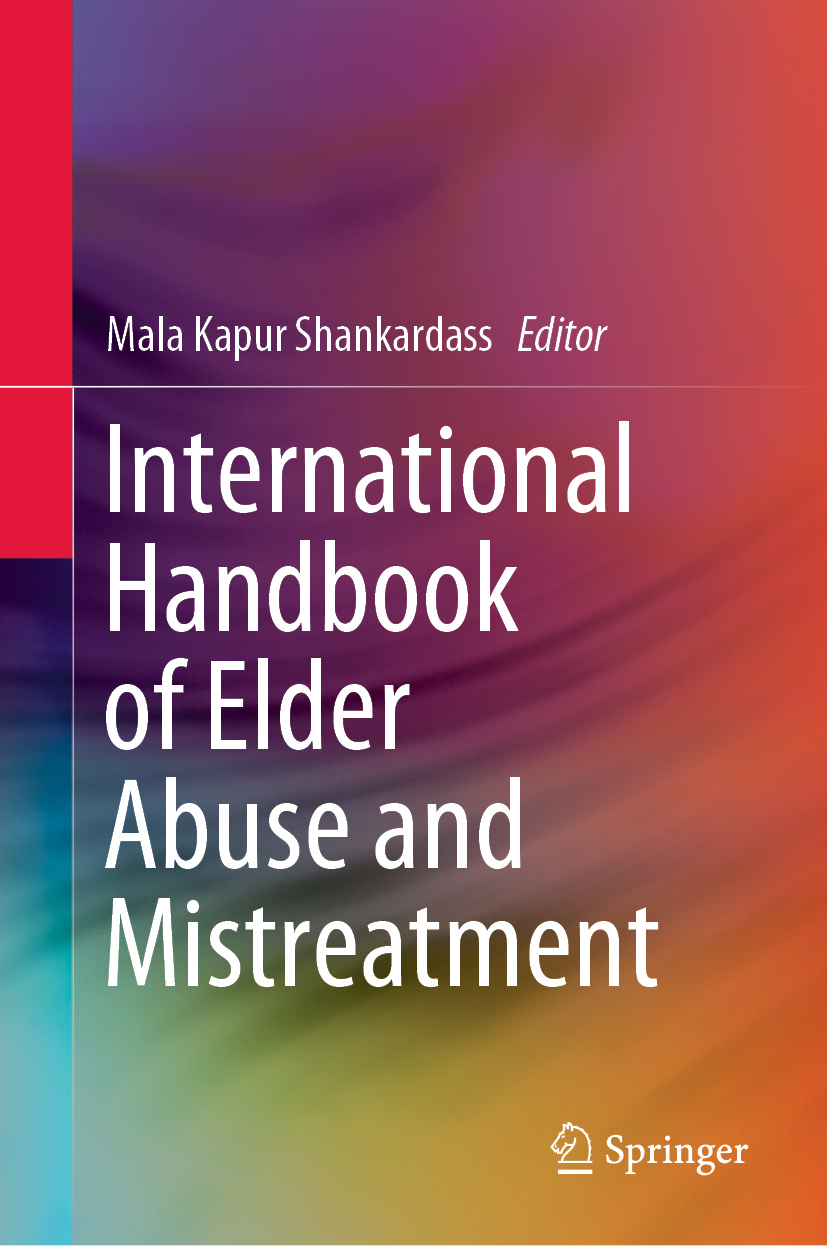

This Springer imprint is published by the registered company Springer Nature Singapore Pte Ltd.
The registered company address is: 152 Beach Road, #21-01/04 Gateway East, Singapore 189721, Singapore
Elder abuse is a hidden problem that takes many forms. These can range from physical, emotional and psychological abuse to financial exploitation and neglect. As many as one in six older people are thought to have experienced one form of abuse or another in the past year, although this is often not reported. This may have occurred in institutions or other formal settings, or in the older persons own home.
Yet all of us have the right to be treated with dignity and respect. Indeed, being safe is identified as one of the core abilities that enable someone to experience healthy ageing. Tackling this insidious breach of an older persons rights is thus essential if we are to achieve the aspirations of the World Health Organizations Global Strategy and Action Plan on Ageing and Health.
Yet progress to date has been utterly inadequate. Research has tended to focus on quantifying the problem, which was essential. Now, we must start to identify solutions and to implement them. We need to identify the risk factors that can help define who is most at risk. We also need to learn how to identify behaviours and transactions that suggest people are being abused. We need to identify interventions that can address these and learn where they will be most effective. We also need evidence on what does not work, for some interventions may make the problem worse. Unfortunately, research on these opportunities is at a far earlier stage.
And having identified what to do and how to do it, we need to scale these interventions up so that every older person can benefit. One way of doing this may be to ensure older people are considered in other global priorities such as the Sustainable Development Goals to reduce violence. Another will be to embed this work in the planned Decade of Healthy Ageing from 2021 to 2030. But regardless of how we make it happen, we have to ensure this is a global priority. We must move forward.
The International Handbook of Elder Abuse and Mistreatment is a welcome initiative to help build attention on this issue and explore some of the critical challenges we confront. I congratulate the editors in pulling this useful publication together and am grateful for the contributions of the many different authors. Let us build on their efforts to address this pervasive problem.
I am grateful to all the scholars who have contributed to this book. Their writing and their research, both primary and secondary, have made this volume very special. They have unstintingly supported my efforts to raise awareness on a very relevant and topical subject. Each one of them very generously gave their time and expert knowledge towards highlighting crucial issues related to elder abuse and mistreatment prevalent in different parts of the world. Coverage of elder abuse concerns across the continents from various perspectives was a huge exercise to which each writer patiently and diligently contributed. I am extremely thankful for their cooperation and insightful multidisciplinary inputs.
This book would not have been completed without the editorial assistance of Priya Vyas and Ramamoorthy Rajangam of Springer who went through every detail and technical format as per professional standards. Their help at many stages has been very valuable and focus on details to make a worthwhile publication is much appreciated. I would also like to express my thanks to Shinjini Chatterjee who initiated this project and encouraged me to complete it by expanding the scope of this book to many regions and countries than what I had earlier envisaged.
I would like to take this opportunity to thank a couple of my professional colleagues, namely Charmaine Spencer from the USA and Rosy Pereyra from the Dominican Republic who supported me in the initial stages of collection of abstracts, but later had to drop out due to their personal compulsions. Their brief writing, however, added to my understanding of issues and helped me compose my thoughts to widen the horizon of this compilation.
I would like to express my appreciation of my husband Suman Shankardass who supported me in many unaccountable ways through many months of completion of this work. His continuous encouragement and guidance with appropriate vocabulary were always welcome throughout this journey. His enduring partnership is remarkable. I want to also thank my son Varun and daughter-in-law Trisha and my siblings Kiran, Rosy, Vikram and his wife Mini for their confidence in my abilities to generate this work along with my other responsibilities. I am grateful to the distractions by my grandson Kirat which provided the necessary stress busters.
Finally, thanks to some of my friends and colleagues from across the world who in their own ways believed in my expertise and handling of this exciting project. Our conversations on ageing issues on occasions inspired me to take forward a dialogue on elder abuse and mistreatment which is not only increasing in ageing societies but also simultaneously getting a response to combat it.
Font size:
Interval:
Bookmark:
Similar books «International Handbook of Elder Abuse and Mistreatment»
Look at similar books to International Handbook of Elder Abuse and Mistreatment. We have selected literature similar in name and meaning in the hope of providing readers with more options to find new, interesting, not yet read works.
Discussion, reviews of the book International Handbook of Elder Abuse and Mistreatment and just readers' own opinions. Leave your comments, write what you think about the work, its meaning or the main characters. Specify what exactly you liked and what you didn't like, and why you think so.

